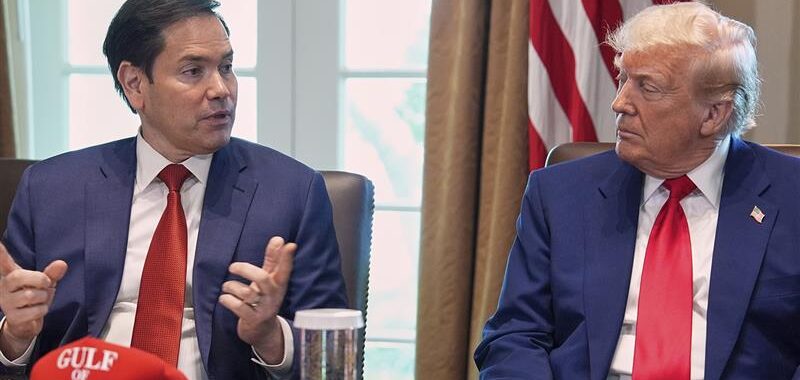
Secretary of State Marco Rubio’s new assignment as President Trump’s interim national security adviser brings him deeper into an inner circle dominated by “America First” loyalists.
But that may not mean more clout on policy decisions.
“It doesn’t signal greater influence over policy,” said Kori Schake, a senior fellow and the director of foreign and defense policy studies at the American Enterprise Institute, of Rubio’s dual roles. “Secretary Rubio appears only to amplify the President’s inclinations, not to influence them.”
Rubio’s supporters, including cautious Democrats, say he can still help mitigate what they view as the president’s worst impulses. But critics say he has given up the foreign policy principles he developed over 16 years in the Senate, in exchange for Trump’s temporary favor.
“In a normal administration, Republican or Democrat — and this is not normal — the double-hatting is impossible,” said Aaron David Miller, senior fellow at the Carnegie Endowment for International Peace, who has advised secretaries of state in Republican and Democratic administrations.
“To add national security adviser to Marco Rubio, I think this makes this system, in many respects, even more dysfunctional.”
While Rubio held the rare distinction of being confirmed unanimously in the Senate, some of his former Democratic colleagues quickly started feeling regret as he did little to publicly push back on Trump’s turn toward Russia in the Ukraine war, while taking an outspoken role in the push for student deportations.
“His position now is secretary of sycophants, not secretary of State,” Sen. Richard Blumenthal (D-Conn.) told The Hill in March.
Rubio was named national security adviser, a role within the White House overseeing hundreds of foreign policy experts, after Trump decided to oust Mike Waltz, who is now poised to become United Nations ambassador.
Waltz was in Trump’s crosshairs for mistakenly adding a journalist to a Signal chat discussing an attack on Yemen, but the former Republican congressman’s clashing with the president’s closest aides reportedly led to his ousting.
Rubio, who reportedly butted heads with Elon Musk earlier this year, is adept at weathering these personality clashes, said one Republican congressional aide.
“Everyone in the administration seems to like him, he’s a team player,” he said. “To be honest, I think it’s a good thing. The boat wouldn’t be paddled in different directions. It gives more of a solid direction to national security policy.”
Schake said she wasn’t concerned about Rubio becoming overwhelmed in the two high-profile roles. He is also the nominal head of the U.S. Agency for International Development (USAID), which has been largely shut down, and the National Archives.
“I don’t agree the Administration’s overstretched, because they’re not really doing the work of policy formation and execution; they’re just doing performance art,” she said in an email to The Hill.
And though Rubio has what have often been two of the most influential roles in Washington, there are plenty of other people vying for the president’s ear on foreign policy.
Among those figures are Vice President Vance, who clashed with Waltz, opposing military intervention in Yemen, and Steve Witkoff, a special envoy whose portfolio has rapidly expanded to include the Russia-Ukraine war, Israel-Hamas war and Iran nuclear talks.
Stephen Miller, Trump’s deputy chief of staff most associated with his immigration policies, is also influential on the foreign policy front, as is Sebastian Gorka, head of counterterrorism at the National Security Council.
Both are on a long list of potential contenders to permanently replace Waltz. Politico reported Friday afternoon that Rubio could keep the role for at least six months.
And while Elon Musk has said he’s looking to step down from his role close to the president, running the Department of Government Efficiency, the tech billionaire has exercised outsized influence on nearly every agency, including Rubio’s.
But Trump’s trust in Rubio to hold both positions caps a remarkable turn in the relationship between the former rivals, however long it lasts.
Trump ridiculed Rubio as “little Marco” on the campaign trail for the 2016 Republican presidential nomination, while Rubio called Trump a “con artist” who has “spent his entire career sticking it to the little guy.”
Rubio would become a fierce defender of Trump in the Senate. And since his confirmation in January, Rubio has been a global presence, joining talks with Ukraine and Russia, phoning his counterparts in India and Pakistan to try to avoid an outbreak of conflict; fielding calls over crises in the Middle East; and convening African nations embroiled in conflict.
He’s also overseeing a massive scale-down at the State Department and USAID.
But the NSA role will place new demands on his time, as the main person tasked with consulting and getting consensus from national security agency heads — spanning intelligence, defense, economics, law enforcement, immigration, to name a few.
Between 1973 and 1975, Henry Kissinger served as both national security adviser and secretary of State for both the Nixon and Ford administrations, but others who have held the role said it’s not a fair comparison.
“Richard Nixon in the depths of Watergate… nominates Kissinger because he knows he can get Kissinger confirmed. There’s only one Henry Kissinger,” John Bolton, who Trump fired as his national security adviser in 2019, told CNN this week.
Miller said it may not matter who is in the role if they aren’t providing candid advice to the president.
“I would ask the question, does it matter that Mike Waltz resigned? Would it matter if Marco Rubio left? The answer is no, because the advisers are not doing what they need to do, which is to present, even when it risks annoying a president, or disappointment, critiques of a policy,” he said.
“Loyalty is critically important in any administration, but not blindly.”

